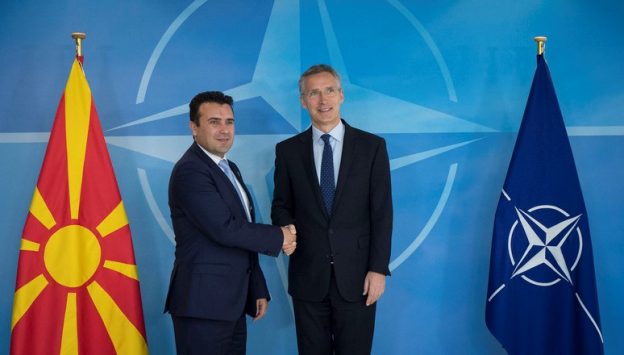North Macedonia officially became a part of NATO in March, when the “instrument for its accession” to the Washington Treaty (also known as the North Atlantic Treaty) was formally deposited with the US State Department.
An initial obstacle to its inclusion was its name, which Greece objected to since its northern province bears the name “Macedonia.” In February of 2019, however, both nations came to an agreement as the new nation, which had previously been known as the Yugoslav Republic of Macedonia, agreed to be caled “North Macedonia.”
NATO will work with its new member on reforming its defense infrastructure and fully integrating it into the alliance.
In the coming months, the NATO Liaison Office in Skopje will focus on supporting North Macedonia with defense reforms and the country’s full integration into the Alliance. In practice, North Macedonia has already worked with NATO in Afghanistan and Kosovo. NATO had provided assistance to the nation in 2001, when violence broke out between ethnic Albanian insurgents and security forces had broken out.
NATO outlined key areas of cooperation between the alliance and its newest member:
Building capabilities and interoperability
- An important focus of cooperation has been to develop the ability of North Macedonia’s forces to work together with forces from NATO countries and other partners, especially in peacekeeping and crisis-management operations. Participation in joint planning, training and military exercises has been essential in this regard.
- Participation in the PfP Planning and Review Process since 1999 has also helped develop interoperability, as well as providing planning targets that are key to security reform and transformation objectives for the country’s armed forces.
- In 2005, the country joined the Operational Capabilities Concept, a mechanism through which units available for operations can be evaluated and better integrated with NATO forces to increase operational effectiveness.
- Participation in the Defence Education Enhancement Programme has helped improve education and training, which is essential for the country’s defence reform efforts.
- Through participation in the Building Integrity Programme, North Macedonia has worked to strengthen good governance in the defence and security sector, and reduce risks of corruption by strengthening transparency and accountability.
- In 2013, the country’s Public Affairs Regional Centre in Skopje was recognised as a Partnership Training and Education Centre, opening its activities to Allies and partners.
Support for NATO-led operations
- North Macedonia deployed troops in support of the NATO-led International Security Assistance Force in Afghanistan from 2002 to end 2014. It is currently supporting the follow-on Resolute Support mission to train, advise and assist the Afghan security forces.
- The country was a key partner in supporting NATO-led stabilisation operations in Kosovo in 1999, as NATO forces deployed North Macedonia to halt the spread of the conflict as well as to provide logistical support to the Kosovo Force (KFOR). The Allies also provided humanitarian assistance to help the North Macedonia deal with the flood of refugees from Kosovo. The country, which once hosted a NATO military headquarters in Skopje during the operational period of KFOR, continues to provide valuable host nation support to KFOR troops transiting its territory.
Wider cooperation
- North Macedonia supports implementation of the Women, Peace and Security agenda.
- The country is strengthening its national civil preparednessand resilience with the support of NATO. Practical cooperation with the Euro-Atlantic Disaster Response Coordination Centre (EADRCC) has also enhanced crisis management capabilities and interoperability.
- North Macedonia has been actively engaged with the NATO Science for Peace and Security Programme since 1998. Recent activities have focused in particular on cyber defence and counter-terrorism, defence against chemical, biological, radiological and nuclear agents, and environmental security.
- National government and local non-governmental organisations have provided public information on NATO and its relations with North Macedonia, with the support of NATO, its Liaison Office, as well as individual Allies and partner countries.
Photo: Speaking in Brussels on March 27, NATO Secretary General Jens Stoltenberg said, “North Macedonia is now part of the NATO family, a family of thirty nations and almost one billion people. A family based on the certainty that, no matter what challenges we face, we are all stronger and safer together.“ North Macedonia is a long-standing contributor to NATO’s Euro-Atlantic security, including by participating in NATO-led missions in Afghanistan and in Kosovo. (NATO)
